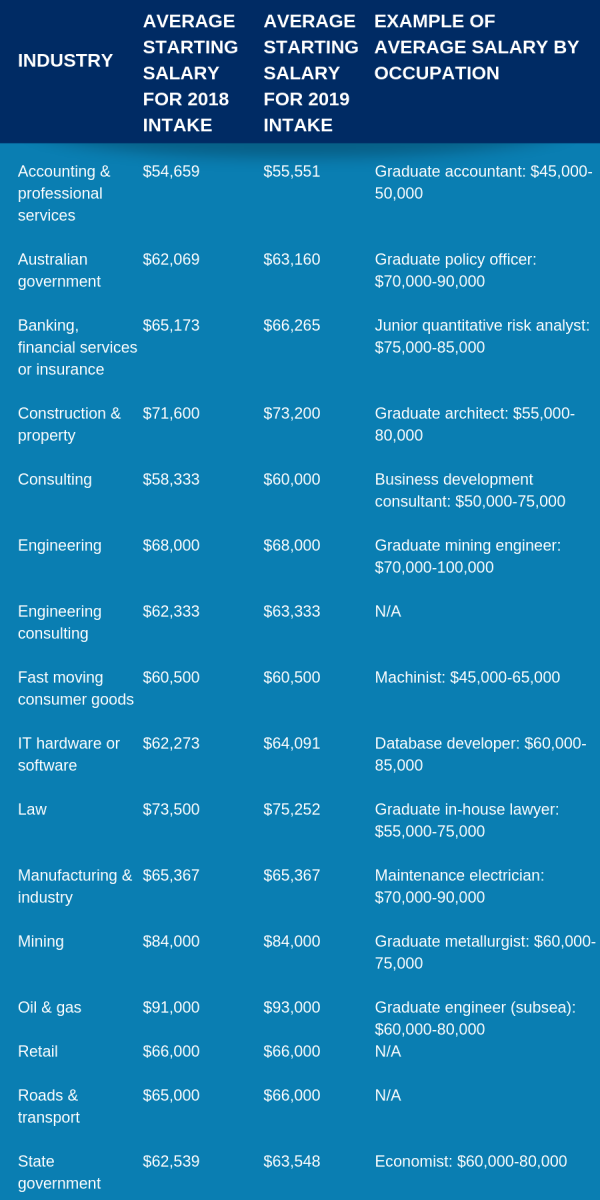What is the average graduate salary in Australia?
Jaymes Carr
Average graduate salaries in Australia
After finishing your degree—three, four, or even five years of study—it’s only natural that you should be curious about your reward. Fortunately, you don’t have to wonder whether or not it would be polite to ask current employees in your chosen field how much they earn: we’ve done the research for you, using up-to-date research to determine not only the average starting salaries for graduates in major industries, but also the salaries associated with certain popular roles. So, if you’d like to know what your salary is likely to be as a graduate, read on to find out.
Average graduate salaries in major industries

Gender, age, home language, and other factors
Published in January 2019, the Quality Indicators for Learning and Teaching (QILT) 2018 Graduate Outcomes Survey provides information on the way in which several factors impact on graduate salaries.
Gender
Notably, it demonstrates the persistence of a gender pay gap, with males aged below 30 earning a median salary 3.6 per cent higher ($61,000) than females in the same age category ($58,800). The gap widens for those who graduate above the age of 30, with men in this category earning a median salary of $75,100 and women earning $67,000, a difference of 10.8 per cent.
Age
Age has a positive impact on median starting salaries, with older graduates receiving significantly higher pay. For example, in 2018, the median salary for older graduates (i.e. those aged above 30) was $8,900 more per year than for those aged 30 years or younger.
Language and culture
In 2018, graduates who primarily spoke English at home earn a higher median salary ($61,000) than those who speak a language other than English at home ($59,500). After graduating, Indigenous Australians earn significantly more (median salary of $65,000) than non-Indigenous Australians ($61,000).
Socioeconomic background
Little variation was seen between the salaries of graduates from different socioeconomic backgrounds. Those from high and medium socioeconomic brackets earned the same median salary of $61,000. This was marginally higher than the median salary of graduates from low socioeconomic backgrounds ($60,500).
Location
The impact of location on salary reflects, perhaps, the influence of the high graduate salaries offered by businesses in the mining and engineering industries. Contrary to what one might expect, graduates in regional and remote areas enjoy a slight advantage, earning a median salary of $62,000 (compared to $60,200 in metropolitan areas).
Disability
Reported disability correlates with a slight reduction in median starting salary, with those who do report a disability earning $60,400, and those who don’t earning $61,000).
Average graduate salaries over time
The QILT survey attracts the largest number of respondents, with 120,564 valid survey responses collected in 2018. In previous years, it has been similarly successful in surveying a cross-section of graduates from different universities, professions, and backgrounds. Hence, its summary of salary changes over time is relatively reliable and encouraging. In the ten years leading to 2018, median starting salaries have increased steadily, from $45,000 in 2008 to $61,000 in 2018. This accords roughly with the results of the AAGE survey, which recorded an average graduate starting salary of $48,000 in 2008 and an average graduate starting salary of $64,455 in 2018.
Common benefits
Of course, attractive salaries aren’t the only way in which graduate employers seek to attract top candidates. The AAGE survey shows that many will also offer various benefits, the most popular of which are employee assistance programs (offered by 93% of employers); flexible work arrangements (87%); a laptop, iPad, or netbook (68%); payment of course fees for further education (50%); staff discounts (47%); paid study leave (46%); and free or subsidised sport and leisure facilities (39%).
Finding out more about salaries at your target employer
When it comes to salaries, the one thing which can be difficult to learn is how much you can expect to earn at a specific organisation. This is where the GradAustralia insider guides come in handy! By searching an employer on our website, navigating to graduate reviews, and selecting the salary tab, you can read about the pay and perks offered to graduates, as well as how satisfied current employees are to receive them. By gaining a sense of what you might earn, you’ll be able to manage your expectations and put yourself in a better position to negotiate. We hope you’re well compensated for your efforts!